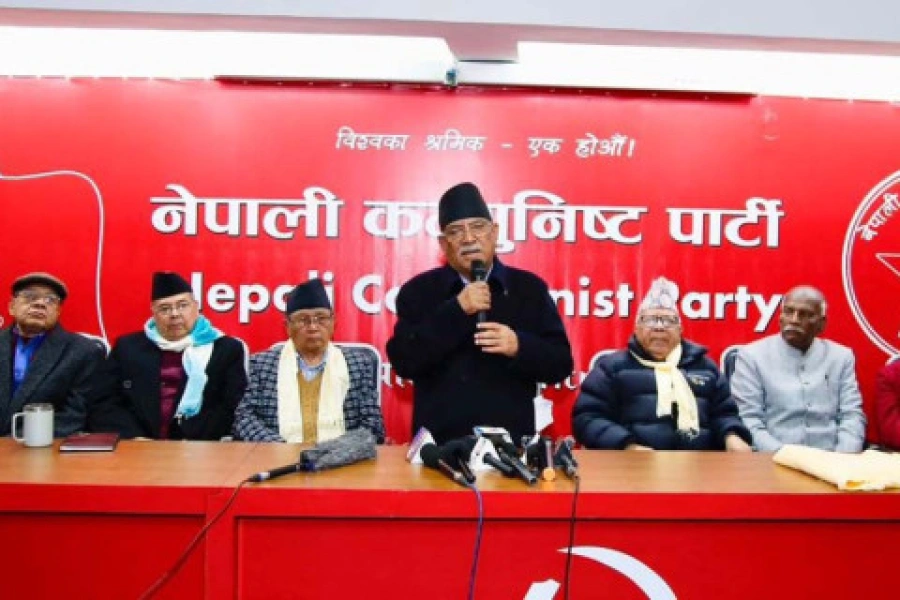Banning TikTok and cryptocurrency contradicts the principles of a free market economy
In the ever-churning landscape of technological discourse, Marc Andreessen, co-author of Mosaic, the first widely used web browser with a graphical user interface has recently unfurled what can only be described as a sweeping declaration: the "Techno-Optimist Manifesto.” This opus has ignited a fervent conversation, heralding the virtues of technology, progress, and limitless expansion while casting a discerning glance at the shadows of gloom, inertia, and stagnation shrouding our society. Yet, as the world grapples with these competing narratives, Nepal finds itself inching towards techno-pessimism. The government's abrupt prohibitions on TikTok and cryptocurrency, bereft of substantive justification grounded in rigorous inquiry, stand as stark examples. Compounding the situation, the trajectory ominously veers toward the construction of a surveillance state, edging Nepal closer to dystopia.
In the midst of this somber tableau, a beacon of revitalization emerges—the Techno-Optimist Manifesto. It resolutely contends that technology, far from foretelling calamity, holds the promise of unleashing human potential and propelling us towards unprecedented prosperity. This manifesto warrants the urgent attention of government leadership as the blanket bans on pivotal innovations of the 21st century threaten to stifle progress and hamper societal advancement. This is particularly critical at a time when a multitude of youth are departing the country due to a dearth of quality education and employment opportunities.
Economic Growth
The opening section of the manifesto starts with a quote from the legendary Thomas Edison, setting the tone for a resolute declaration against the prevailing lies that permeate discussions about technology. The manifesto asserts that our civilization is built on technology and continues to thrive on it. It counters the prevalent narrative that technology is a threat, emphasizing its role as the "glory of human ambition and achievement" and the spearhead of progress.
Techno-Optimists believe in growth as progress. They argue that economic growth, fueled by technological advancement is not only beneficial but essential for the vitality, expansion of life, and higher well-being of societies. Stagnation fosters zero-sum thinking, internal conflicts, degradation, and eventual collapse, highlighting technology as the perpetual source of growth. Nepal has long been trapped in a state of stagnation, leading to a lack of hope for everyone in the country, especially the youth.
AR Rahman, Ameya Dabli to perform at Ekam Satt - Unity Concert:...

Free Market Economy
The manifesto strongly advocates for free markets as the most effective way to organize a technological economy. This is because the market economy functions as a discovery machine—an exploratory, evolutionary, and adaptive system. Free markets have the remarkable capacity to lift people out of poverty, promoting individualism and achieving superior collective outcomes. Moreover, the market naturally disciplines participants and prevents monopolies and cartels. Drawing a parallel between market discipline and the prevention of monopolies, the manifesto underscores the role of markets in generating societal wealth for various purposes, including basic research, social welfare programs, and national defense. This perspective resonates with the ideas of Friedrich Hayek, who emphasized the knowledge problem associated with centralized economic planning.
Banning TikTok and cryptocurrency contradicts the principles of a free market economy. Free markets are essential for technological progress, functioning as discovery machines that drive innovation through competition and discipline. Imposing bans disrupts this natural process, stifling the potential for individual prosperity and collective advancement. By restricting emerging technologies, the government interferes with market discipline, inhibiting competition and preventing the formation of monopolies. Consequently, such measures align more closely with communism, which emphasizes centralized control and state regulation over individual economic activities.
The Techno-Capital Machine
The manifesto also discusses the concept of the techno-capital machine, portraying it as a driving force of perpetual material creation, growth, and abundance. This machine is depicted as an upward spiral, continuously propelling societies towards progress. It argues that technology and innovation leverage natural selection in the realm of ideas, fostering continuous improvement. Banning cutting-edge technology contradicts the vision of a techno-capital machine propelling societies forward. It disrupts the perpetual creation and growth of technology, hindering the upward spiral towards abundance and improvement.
The deliberate advancement of technological development, aimed at fulfilling the Law of Accelerating Returns, challenges the notion that the techno-capital machine is inherently anti-human. Instead, it posits that technology serves humanity by generating abundance. This abundance is fueled by intelligence and energy, identified as the cornerstone resources of the techno-capital upward spiral. The ban on emerging technologies contradicts accelerationism.
Not Utopians, but Realists
Techno-Optimists are realists who emphasize the importance of accepting people as they are, testing ideas empirically, and allowing individuals to make their own choices. The manifesto rejects utopian ideologies, highlighting that change occurs at the margin, and numerous small changes can lead to significant outcomes. However, while not dismissing challenges and recognizing that change only happens incrementally, Techno-Optimists align with the concept of "slouching toward Utopia." They believe in doing the best fallen humanity can do, continually making improvements, and embracing the potential for a better future.
Technological Values and the Meaning of Life
The manifesto also outlines a set of values that underpin Techno-Optimism, including ambition, merit, bravery, pride, and a rejection of resentment. It aligns with the ideals of free thought, free speech, and free inquiry, emphasizing the importance of questioning authority and embracing variance. The manifesto advocates for the actual Scientific Method and Enlightenment values of free discourse. This echoes Richard Feynman's statement that "Science is the belief in the ignorance of experts" and expresses a preference for questions that can't be answered over answers that can't be questioned.
The Ultimate Goal: The Future
One commendable aspect of the manifesto is its call for embracing Techno-Optimism and striving for a future driven by technology, abundance, and vitality. It stresses the obligation to remain optimistic, citing David Deutsch's belief that "we have a duty to fight for a better world." Finally, the manifesto poses a crucial question: What kind of world are we leaving for our children? It serves as a rallying cry, urging individuals to actively contribute to shaping a future where technological progress, abundance, and optimism triumph over fear and inertia.
Informed Policy Making through Progressive Thought
The manifesto presents a compelling narrative that challenges prevalent anxieties about technology. It advocates for an empowered and forward-thinking approach to technological progress, highlighting its potential for abundance, growth, and human well-being. While acknowledging the existence of challenges and adversaries in the form of negative attitudes, the manifesto calls for unity in fostering a future where technology serves as a force for positive transformation.
Given the importance of this perspective, it is crucial for major political parties to familiarize themselves with the manifesto's principles. Banning emerging technologies is worrisome, as it could impede progress and innovation, leading to stagnation rather than the envisioned prosperity. A thorough understanding of the manifesto is essential for policymaking that promotes both technological advancement and societal welfare.
The prohibition of TikTok and cryptocurrency not only impacts content creators and innovators in the short term but also undermines Nepal's potential to thrive in the future creative economy. It is therefore vital for those in positions of power, particularly within Singha Durbar, to prioritize reading the manifesto without delay. With the advent of AI-driven solutions and dwindling remittances, Nepali youth will be particularly affected by automation, necessitating advocacy for radical changes in Nepali politics. Without such changes, the country risks regressing into a state akin to North Korea.







































